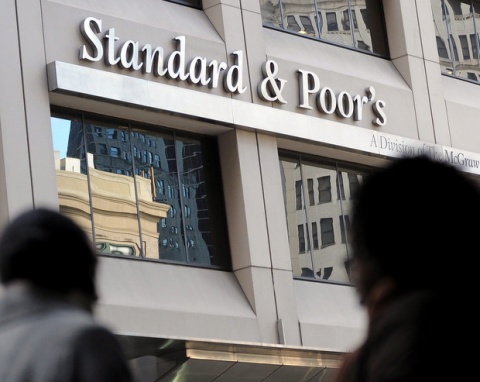S&P approves Azerbaijan’s sovereign credit ratings as stable

Standard & Poor's rating services approved long and short time sovereign credit ratings on Azerbaijan at BBB-/A-3. The rating outlook is stable. The agency kept the transfer and convertibility assessment at 'BBB-'.
"The affirmation of sovereign ratings reflects Azerbaijan's stable public sector net asset and strengthening external creditor positions, which maintain substantial fiscal and external buffers. In this regard, we also consider general government debt as still-limited despite an upcoming budget deficit," the S&P's report published on August 2 reads.
Due to higher public spending, economic growth should reach 3.8% in 2013, the highest in three years, agency's experts noted.
"While the oil sector is still in recession--with production only expected to rebound later this year--public spending (especially on infrastructure) is contributing to higher growth rates in the non-oil sector," the report reads.
According to the forecast of S&P, this growth will accelerate to five percent in 2014, equivalent to an average 3.6% GDP per capita growth for the forecast period (2013-2016). The agency expects that, oil production will likely plateau through 2017, and its possible declines in the immediate years will be offset by the increased gas production.
The further development of the Shah Deniz II gas field has also received a boost in the form of concluding agreements for the construction of the pipeline for transportation of Azerbaijani natural gas to Europe: the State Oil Company of Azerbaijan Republic (SOCAR) has chosen the Trans-Adriatic Pipeline as the connecting grid to the Trans-Anatolian Pipeline (TANAP).
Hydrocarbon exports should ensure continued current account surpluses, though they will gradually decline from 20.6% of GDP in 2013 toward 16% by 2016 at an expected average oil price of $104 per barrel. Given estimated gross external financing needs at 58% of current account receipts (CARs) plus useable reserves, as well as narrow net external assets of about 100% of CARs, Azerbaijan is in a strong external position even if data shortcomings are substantial.
"In line with external surpluses, Azerbaijan's fiscal balances should become positive again in the medium term, though we forecast a consolidated general government deficit of 3.8% of GDP in 2013--the first in a decade. This has been driven by substantially increased government expenditures, particularly in capital investment, aimed at stimulating broader economic growth ahead of presidential elections in October 2013. While this constitutes a deterioration in the fiscal profile, capital expenditures equaling a high 46% of total expenditures provides a large degree of fiscal flexibility in the event of a decline in oil prices. The flipside is the government's considerable dependency on oil revenues (about 60% directly from oil sales and an estimated 12% from corollary revenues) and the small tax base to generate alternative revenue sources," the report reads.
According to the exports of the agency, the government also benefits from the large liquid assets of the State Oil Fund of the Republic of Azerbaijan (SOFAZ), a fiscal reserve fund invested externally, whose assets exceed $34.7 billion as of July 2013 (42% of GDP), slightly up from $34.1 billion at the end of 2012.
"Even if SOFAZ is not expected to add further savings in 2013 and could even see a decline, its assets provide the sovereign a considerable cushion to mitigate oil price decline. Furthermore, at 5.4% of GDP in 2013, the gross central government debt burden (excluding guarantees) is very small - 5.4 percent of GDP in 2013,' the report said.
According to S&P, the geopolitical and political risk affects rating constraints. In particular, the frozen conflict with neighboring Armenia (not rated) over the territory of Nagorno Karabakh retains potential for armed confrontation.
"As for domestic situation, we consider Azerbaijan's government to enjoy high popular legitimacy on improving standards of living. We also note that the independent institutions, accountability, and transparency, which are needed to maintain an efficient market economy, are mostly still in the early stages of development, in our view," the report said.
Agency believes that, a final rating constraint is that Azerbaijan's monetary and banking systems are underdeveloped, with weak governance and underwriting standards. At the same time the dollarization levels have declined markedly, (now representing 44% of all deposits and 32% of all loans as of year-end 2012). While the increased use of the manat generally improves the transmission of monetary policy, we note that high funding costs for banks weaken the transmission mechanism.
"Furthermore, monetary policy lacks efficient instruments to neutralize large-scale capital inflows effectively and we view coordination with fiscal policy as insufficient," the report said.
On the one hand the stable outlook reflects a further strengthening of Azerbaijan's external balances and a stable trajectory for its fiscal balance sheet and on the other hand, it reflects a moderate growth prospects and an unreformed institutional framework.
"We could consider raising the ratings if Azerbaijan's net external asset growth were supported by a significant improvement in the macroeconomic environment, an acceleration of structural reform and diversification efforts, as well as a strengthening of monetary policy and the banking system.
"Conversely, a significant shortfall relative to our expectations about the development of external and fiscal buffers would put downward pressure on the ratings. So too would a further weakening of economic and political governance structures, which in turn could hamper rational and efficient economic policy formulation and implementation," the report said.
Here we are to serve you with news right now. It does not cost much, but worth your attention.
Choose to support open, independent, quality journalism and subscribe on a monthly basis.
By subscribing to our online newspaper, you can have full digital access to all news, analysis, and much more.
You can also follow AzerNEWS on Twitter @AzerNewsAz or Facebook @AzerNewsNewspaper
Thank you!
